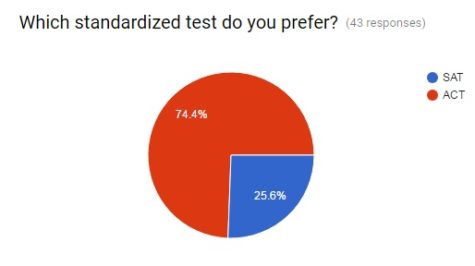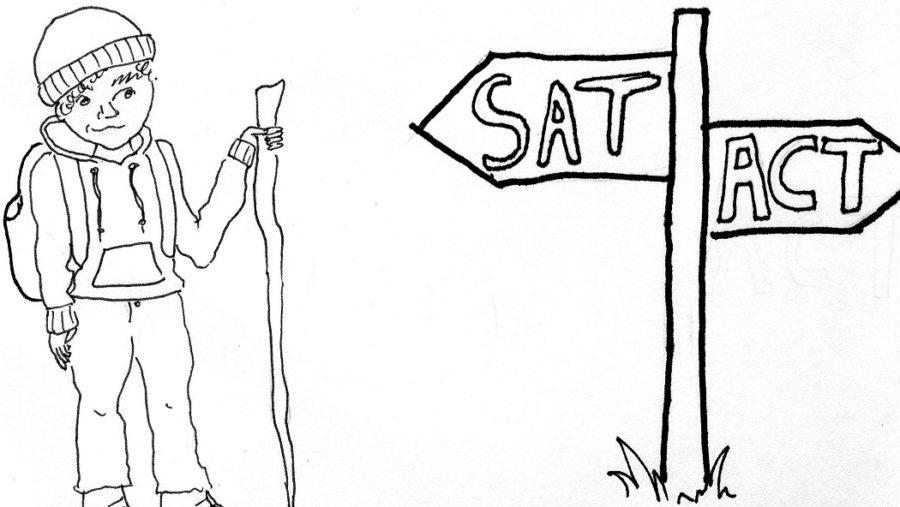College Board takes the “W” as Illinois transitions from ACT to SAT
In a survey of 43 students at VHHS, an overwhelming 75 percent’s preferred college entry exam was the ACT, but is that response because it is the superior test, or just because we are in the midsts of transitioning to the SAT?
Our school’s test coordinator, Mr. Andrew Young, is very familiar with the history of college entry exams and how they are distributed throughout the state.
“Years ago, there were kids that didn’t get access to a college entrance exam,” Young said. “Then, the state was like, ‘That’s not fair,’ so they decided to pay for one for everybody. Technically, this SAT is a part of that program; a free college entry exam for every junior in the state of Illinois.”
The state of Illinois started to distribute free college entry exams in order to include families who may feel pressured by the test’s hefty price tag.
As far as benefits, transitioning to the SAT actually allowed the states to essentially hit two birds with one stone as far as accountability and college entry exams.
The PARCC test, which will no longer be distributed at the high school level did meet, “federal criteria that states had to follow as far as accountability,” according to Young, “but the SAT ended up meeting those as well.”
Taking on the SAT was a strong component in the state’s decision to drop the PARCC exam.
“PARCC is still happening in grades three through eight,” Young said, “it’s not gone completely. We got to drop it because the SAT fits some of the same criteria.”
The PARCC test was, however, a heachache that both students and staff were happy to be rid of.
“Thank goodness that’s over with,” Young joked.
As far as why we switch, there isn’t exactly a straightforward answer from any online source.
“My answer will be mixed with some assumptions and what I’ve heard,” Mr. Young clarified. “Every few years, the contract [for the ACT] is up for a bid with the state of Illinois. ACT’s contract was up last year, so SAT, as they did in multiple states, put up a pretty good bid to get the contract.”
This “good bid” is true from both a monetary stance and presentation of how our state could benefit from switching over.
“They have a process where you can test eighth graders all the way to juniors and seniors taking the SAT and track student growth through all the different measures, subscores, and total scores.” Young said.
The ACT used to have a similar system known as the EXPLORE and PLAN tests. Students in eighth and ninth grade would take the EXPLORE test, then sophomores would take the PLAN test, and finally juniors and seniors would take the ACT.
This was a good way for students to track their growth. Illinois, however, dropped these preparation exams in order to take on the ACT’s Aspire test.
“[The Aspire] didn’t necessarily go over well,” Young admitted.
Aspire didn’t have the same growth tracking that the EXPLORE and PLAN tests did.
“The other thing that was impressive to the state was College Board is working closely and have a contact with Khan Academy.” Young said, “[This] allows all students, regardless of background and ability to get test prep, to prepare for this college entry exam.”
Khan Academy, a website that is known for giving children the opportunity to learn outside of the classroom, is expanding its horizons to include the SAT.
“You can now take multiple SATs, you can sync your PSAT 8/9, PSAT 10, or National Merit Scores, which are completely aligned to the SAT, to Khan Academy,” Young said, “and it will individualize your practice as you prepare for the SAT.”
Khan Academy, which now includes seven full-length SATs, rightfully so gave the ACT a run for their money.
“If there are specific skills that you’re struggling with in ninth grade, it individualizes the skills you need to work on as you prepare for the SAT,” said Young.
In case you missed it: Khan Academy will sync all previous PSAT/SAT scores, personalize the perfect practice plan for you, and give you a place to take full-length exams.
Signing up for one SAT is $55. Khan Academy offers its services for free.
For students or families looking to start college entry exam preparation early, Khan Academy also offers a diagnostic test to see where you can begin improvement from as early as eighth grade.
“The SAT’s not a perfect test,” Young admitted, “you can google, “SAT,” and find a host of things wrong with it, it’s completely imperfect, but all universities now accept it across the United States.”
It’s true that there are flaws within the SAT, but it’s undeniable that it is taking steps to better itself.
“You used to get points taken off for guessing,” Young said, “they got rid of that, it doesn’t hurt to guess. There are plenty of imperfections, but there are some strengths to it as well.”
On top of the removal of the guess penalty, the SAT’s additional hour of testing allows students to process the test for longer.
“I prefer the SAT,” Cole Wharton (11) said. “I feel that the ACT is too rushed, whereas the SAT gives you time to really think about the question, limiting the amount of guessing.”
Illinois isn’t the only state switching from the ACT to the SAT, either. Other states that switched this within the last two years include Michigan, Connecticut, and Colorado.
But still, most students overwhelmingly preferred the ACT.

Young had an interesting take on these results and how he believes they will shift in the future.
“As human beings we naturally prefer things that we’re comfortable with,” Young said. “For years, what [we’re] comfortable with was the ACT, so I think that is our preference. I think there are some intricacies of the test that some people may favor or not favor, and that won’t change. My gut tells me that in a couple years those results will change.”
Wharton, despite being in the minority of students, shared a similar belief.
“I feel that people aren’t used to the SAT, and most people are afraid of change, especially when it decides your future,” Wharton said. “Also, we’ve been preparing for the ACT our whole lives, so I feel like most students my age feel more prepared for that.”
The state’s transition to the SAT has certainly been noticed by staff as well.
“I’ve heard multiple staff say they’re surprised at how similar our curriculum is to the SAT,” Young said. “To the point where some have actually indicated in certain departments that our curriculum is more aligned to the SAT than the ACT.”
However, if the SAT isn’t your speed, it by no means has to be the college entry exam that you take.
“We want kids to use the test that helps them with whatever their plans are after they leave Vernon Hills,” Young said. “If next year’s group is also still more comfortable with the ACT, no one’s ramming SAT down their throat.”
Both Vernon Hills and Libertyville will continue to offer national test dates in efforts to support those who feel more comfortable taking the ACT. The shift only affects the test is distributed for free once a year.
“We don’t get to choose which test we’re giving in April,” Young said, “and the state does not allow us to exempt kids for their accountability test, but I get why kids are using their ACT.”
As for that April test day, it is still required that students satisfied with their score attend in order to represent VHHS.
“Vernon Hills and Libertyville have both have had state and national recognition for how successful our kids are,” Young said. “My hope would be that our best and brightest sit for that [April] test because we can’t use your random Saturday ACT or SAT in our state data. We need your academic excellence to show up on that April day because that’s how everyone’s viewing our school.”
Getting a lower score if and when you retake it with the school will not affect your acceptance into a college; there is nothing to lose when taking it after achieving a satisfactory score.
“Regardless, I don’t get to make that call [to let kids exempt the school’s testing day]. They need to call the governor if they don’t want to sit through the SAT,” Young joked. “I don’t get to say yes to that, but I get it.”
In the aforementioned survey, there was no defining difference in scores between either exam; If you’ve done well on the ACT in the past, you’ll probably be just as successful on the SAT.
“Historically,” Young said, “kids who do well on one typically do well on the other; there is a correlation there,” Young said. “If the question is: ‘Will Vernon Hills continue to have a strong average for students who take the college placement exam relative to schools in the state?’ the answer is yes because you guys do well on anything you do.”
The bottom line is this: whichever college entrance exam works best for you, personally, is the better exam. There are flaws and benefits to each test, but if you feel you perform better on one, VHHS will support you.
“For students, I would just say to hang in there,” Young said. “At the end of the day, we will support them and whatever their goals are after they leave us. They need to have confidence that they will do great on no matter what piece of paper is placed in front of them. Keep being awesome, you’re going to be fine.”

